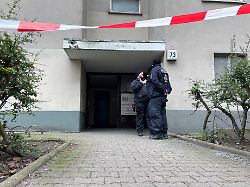RAF pensioners ran out of money
Investigators expected new attacks from Burdock and accomplices
February 27, 2024, 2:55 p.m
One of the most wanted people in Europe is exposed in the middle of Berlin-Kreuzberg: police officers catch the RAF terrorist Daniela Klette. The 65-year-old is said to have been involved in several armed robberies. Two accomplices are still missing. They may also become careless. Money is running out.
She was at the top of the list of Europe’s most wanted people with the note “dangerous”. If the suspected RAF terrorist Daniela Klette were to unpack after her arrest, there would be a lot to tell – for example about life underground or the mysteries of the third generation of the left-wing extremist Red Army Faction (RAF). The investigators are also looking for information about the whereabouts of Klette’s alleged accomplices Ernst-Volker Staub and Burkhard Garweg – but it is doubtful that the 65-year-old will comment.
Klette was arrested in Berlin on Monday on the basis of an arrest warrant from the Verden public prosecutor’s office. The investigators in the Lower Saxony city put Burdock, Staub and Garweg on Europol’s list of the most wanted people in Europe. A reward of at least 150,000 euros was offered for information leading to the arrest of the trio, who were also referred to as RAF pensioners because of their advancing age.
It is unclear whether anyone will get the money now. The Verden public prosecutor Koray Freudenberg did not yet know under what circumstances the arrest occurred. Only Freudenberg is certain that the person arrested is really Burdock. Klette, who was born in Karlsruhe in 1958, was apparently arrested without resistance.
Klette is said to have bragged about his RAF past at the party
The Lower Saxony investigators had recently significantly increased the search pressure in their ongoing investigations into attempted murder, among other things. Almost two weeks ago they reported on the search on the ZDF program “Aktenzeichen XY … unsolved”. A good 240 tips were subsequently received, around 80 of them anonymous. The investigators justified the increased search pressure with the assumption that Klette, Staub and Garweg were gradually running out of money and that heavily armed attacks with rocket-propelled grenades or machine guns could soon be expected again.
From 1999 to 2016, the three are said to have committed several such attacks to make a living and were also guilty of attempted murder. Chief Public Prosecutor Freudenberg recently warned on Norddeutscher Rundfunk that people could possibly die in a new robbery. The traces from the attacks are the most concrete evidence of the trio, who have been in hiding for over 30 years. The trio is said to have robbed in Bochum, Essen, Wolfsburg, Cremlingen and Stuhr, among other places. There are photos of the two men from a public bus in Osnabrück that are a few years old, but the search for Klette continued using old mugshots from the 1980s.
How their life went underground is completely unclear. A report in Berlin-Brandenburg Radio in December provided a clue. A man there reported that he had met Klette at a meeting of the international hacker collective Anonymous in 2012, without knowing her name. In 2017, she is said to have invited him to her birthday party in her apartment in Cologne and identified herself there by showing an old wanted poster with RAF terrorists.
RAF terrorists remain steadfastly silent
Only investigators can determine whether it is true that Klette may have lived in Cologne for a while. However, the Verden investigations have nothing to do with the last acts of terror committed by the RAF, which was dissolved in 1998. The RAF expert Butz Peters called in the newspapers of the Germany editorial network to make Klette see a leniency program in order to “shed light on the crimes of the third RAF generation.”
The fatal bomb attack on Deutsche Bank boss Alfred Herrhausen in 1989, the murder of Treuhand boss Detlev Rohwedder in 1991 and the bomb attack on the still unused new prison building in Weiterstadt, Hesse in 1993 are the last RAF acts remembered nationwide. Based on past experiences, it is doubtful whether Klette will say anything about this.
The RAF adopted a strict vow of silence, which all those arrested have adhered to so far. In 2011, after a long prison term, Birgit Hogefeld, a leading figure in the third generation of the RAF, was released. But although Hogefeld distanced herself from left-wing extremism in court, she never spoke out about the terrorist acts.
